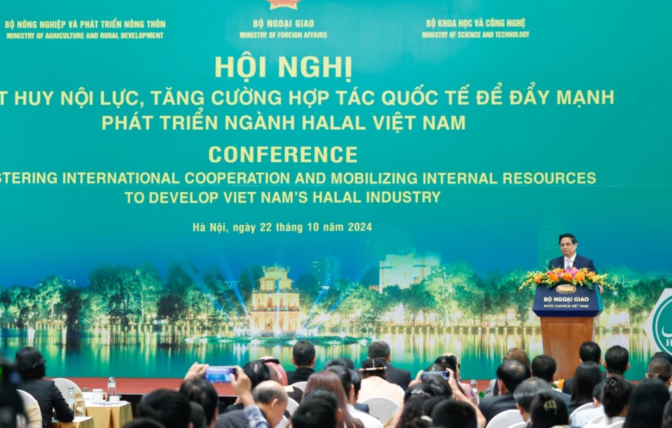
 "
"

 "
"

Vietnam is taking significant strides to establish itself as a major player in the global halal economy, leveraging its geographic position and agricultural strength to penetrate an ever-expanding market. The recent “Vietnam’s First Halal Conference” in Hanoi, themed “Fostering International Cooperation and Mobilizing Internal Resources to Develop Vietnam’s Halal Industry,” marked a pivotal step in this journey. Vietnamese Prime Minister Pham Minh Chinh highlighted the sector’s potential, not only as a novel economic opportunity but as a central pillar of international collaboration. He urged Vietnamese businesses to seize this “golden opportunity” to scale their production, form new partnerships, and engage with the global halal value chain. With the global halal market projected to reach $3 trillion by 2030, Vietnam’s entry comes at an ideal time to tap into rising demand from both Muslim-majority and non-Muslim countries, where halal standards are increasingly valued for their quality and ethical appeal.
Vietnam’s strategic location in Southeast Asia provides a unique advantage, placing it near major halal importers such as Indonesia, Malaysia, and Singapore. The country’s robust agricultural sector, known for its production of rice, seafood, coffee, and spices, forms a solid foundation for halal production. By adopting halal certification across its agricultural supply chain, Vietnam aims to diversify its export portfolio, targeting both Muslim and non-Muslim consumers who prioritize halal-certified products. This strategic move is backed by partnerships with international halal certification bodies like the Korea Halal Agency and the European Certification Centre, with the aim of developing an internationally recognized certification system. These partnerships were solidified at the conference through memorandums of understanding, which will support the country’s certification standards and training efforts, thereby enhancing Vietnam’s integration into the global halal supply chain.
Additionally, Vietnam’s commitment to the halal economy extends beyond products to include halal tourism, catering to a growing segment of Muslim travelers. Popular destinations like Da Nang, Nha Trang, and Phu Quoc are already offering halal-certified dining and prayer facilities, signaling the country’s potential as a Muslim-friendly travel destination in Southeast Asia. As Vietnam continues to develop its halal infrastructure and strengthen ties with the Organization of Islamic Cooperation (OIC) member states, its role in the global halal economy is poised to grow. By investing in sustainable practices within the halal sector, such as eco-friendly production and ethical tourism, Vietnam could further differentiate itself, appealing to consumers who value both quality and responsibility. As Vietnam pursues a comprehensive halal strategy, the nation is well on its way to becoming a formidable presence in the global halal market, enhancing its economic resilience and fostering new diplomatic ties.